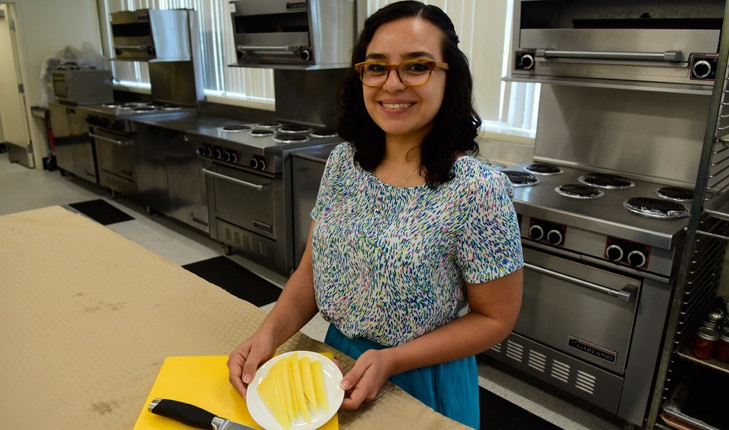Some of Dr. Carmen Licon Cano’s fondest memories as a child came from sampling asadero cheese made by her great uncle at the family creamery while growing up in the Northern Mexican city of Delicias in Chihuahua.
He made the tangy and savory cheese with milk from her grandfather’s farm, which was also used in fresh cream and ricotta cheese products that were sold throughout the region.
“Asadero is similar to mozzarella cheese, except they let the milk ripen a little before they process it to make it more acidic and give it a stronger taste,” said Licon Cano, a Fresno State food science and nutrition professor. “It’s something I still really enjoy when we visit family that still live there, and we always make sure to bring some back home to Fresno.”
Those same memories have led Licon Cano around the world to France, Spain and now the Central Valley to conduct research and teach classes in food and dairy product processing and sensory perception.
Now, she will be leading Fresno State students to study in Mexico thanks to a new partnership with the Universidad Panamericana in Aguascalientes entitled “From Cows to Neurons: A Binational Student-Faculty Study Abroad Program.”
The two-week intensive study experience will connect faculty and experts in each location with six students and one faculty member from each campus who will engage in hands-on learning, cheesemaking and industry networking. Originally planned for summer of 2021, the program may be delayed until summer of 2022 if COVID-19 pandemic restrictions affect campus-sponsored or international travel.
The program will showcase all elements of the dairy production chain, including food chemistry, marketing, processing, production, quality, safety, sensory analysis and technology.
The program is made possible by a $25,000 grant announced by the 100,000 Strong in the Americas Innovation Fund. Fresno State was included as one of 11 United States and Mexican university partnerships, and it was the only American university selected from the West Coast.
The program is supported by the U.S. Department of State, U.S. Embassy in Mexico, Fundación Banorte and Fundación Gruma to create new models of academic exchange and workforce development. Fresno State was selected in the category related to economic inclusion, agricultural sustainability and inequality reduction.
“This is a great opportunity for students from various backgrounds to learn and work closely with professionals in all aspects of food and dairy, with several topics focused specifically on cheese,” Licon Cano said. “They can gain important cultural experiences while learning about product development, sustainability and other topics.”
Additional support for the Fresno State portion will be coordinated by Dr. Susan Pheasant, director of the Institute for Food and Agriculture. Other potential lecturers include Jordan College of Agricultural Sciences and Technology faculty Dr. Steven Pao, Dr. Erin Dormedy, Dr. Kyle Thompson, campus creamery manager Daniel Avila, and cheese and dairy industry professionals.
Students will work within the Jordan Agricultural Research Center, the campus creamery and the campus dairy, which milks about 150 Holstein and Jersey cows twice daily. Students work at these campus farm units year-round and process fresh ice cream, milk and cheese products sold at the Gibson Farm Market on campus.
Licon Cano was connected to the Central Mexican university and her organizing faculty counterpart, Dr. Julieta Dominguez Soberanes, thanks to prior connections between the Fresno State Lyles College of Engineering and the Universidad Panamericana.
Campus staff and faculty from both universities hope the one-year grant leads to future collaborations with other commodities such as corn, tomatoes, grapes or wine.
“Cheese has a special place in my heart, so this is a meaningful way for me to share that passion with students, both here and in Mexico,” Licon Cano said. “When I meet with our local industry members, they emphasize potential needs for training their workers, so I hope this is the first step of many towards increasing our opportunities and facilities for the cheese and dairy processing industry in the Central Valley and beyond.”





